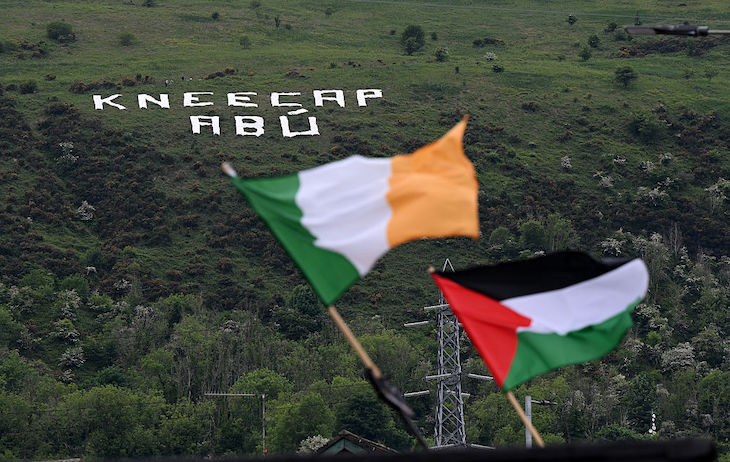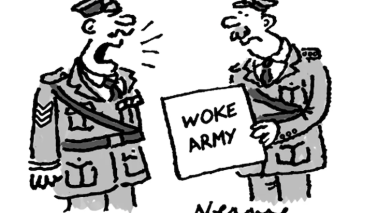Perhaps the strongest asset of the Conservative party is its members (reader, I married one!) and the best part of this leadership contest has been meeting so many of them. On the campaign trail, I’ve encountered three types of party member. The first want to refight the last election, but with different policies. The second worry about the party’s ability to survive, let alone fight the next election. The third are there for the show – and the selfies. And when it comes to leadership hustings, we Tories lay on pretty regular shows. I sympathise with those in the first group: I’d love to go back in time and have better arguments. But we can’t; we need to focus on the future. That’s why I’m in the second group. I worry that our party is withering away. New policy announcements won’t bring it back. What’s needed is renewal.
I’m not Maggie. I’m not a chemist. I’m Kemi. I’m an engineer
Some have tried to blame Nigel Farage for the Tories’ troubles. But that’s wrong: Farage is not the cause of our problems, but a symptom. Many members tell me they voted Reform but are glad I am running. Others ask how someone on the right like me can win back the centre. I tell them it’s not about left or right, it’s about right or wrong. This always gets a big clap from the audience. Keith Joseph famously said that the Conservatives should stand not on the centre ground between Westminster political poles but on the common ground between politicians and the public. We have forgotten that common ground. It’s time to get it back.
Instead of listening to voters, the Conservatives churned out a laundry-list of promises with no idea how to keep them. Simply announcing policies and hoping that, magically, things would happen isn’t politics. It’s witchcraft – and voters notice. That’s why we lost their trust. In village halls, hotel lobbies and people’s living rooms, I tell our members we lost because we spent too long talking right but acting left: Conservatives lost sight of the principles we were supposed to be defending. That’s why I am not starting with a policy wish-list but with principles. I don’t want to repeat the mistakes that got us into this mess, but I know that’s not an easy campaign message.
I come across people who agree with me and I am pleasantly surprised when they say they read my campaign’s pamphlet, Conservatism in Crisis. But there are also impatient sceptics. ‘Yes, yes,’ they say, ‘but where are the policies?’. I accept that they are in a hurry. They want an election re-match and they want it now. The leader of New Zealand’s conservatives, who met the King last week, faced similar pressure. But he told his party to wait, to get the basics right and do the policies later. That road led back to power and it’s the road I want the Tories to take now.
It’s sometimes said that the leadership campaign tests candidates to see if they can handle a general election. I can see why: 18-hour days, seven days a week, with lots of travel, are not easy. I’ve lost my voice three times. People ask if I’m exhausted, but the whole process is energising. I’m meeting people who believe in our Conservative cause: and I’m listening to them.
Many of my team are in their twenties and thirties and I listen to them talk as they drive me around from county to county. They often think I’m sleeping, but I’m taking in what life is like for them. There’s the usual politics gossip, of course, but also talk of families, home purchases and the endless abuse they get for being Conservatives. It wasn’t like this for me 20 years ago. We have let these young people down and I promise them silently that I will fix things. As every day on this campaign passes, we feel more like a family: but I miss my children.
My favourite moments are when I meet members who say: ‘My children who aren’t even interested in politics talk about you. If you can engage them you can win the country’; ‘You make me excited about the future’; or ‘I joined the party so I can vote for you.’ I hope there’s another 100,000 or so more of them out there.
The most bizarre bits of the campaign are the many conspiracy theories I hear. A lady comes up to me and expresses her support. But she has one concern: ‘Are you a member of WEF (the World Economic Forum)? If not, why did you go to Davos?’ I feel bad having to tell people that Davos is actually quite boring. It was also cold and the food was terrible. It makes Conservative party conference look like Woodstock. More amusing are the conspiracy theories that I have a puppet master: I take it as a backhanded compliment. If I was running a terrible campaign or doing badly, they wouldn’t say so.
I’ve seen the criticism of my campaign: that I’m too much of a fighter, that I don’t play the Westminster games. But when the Conservatives are down to 121 MPs, isn’t it time to fight for what we believe in? If not now, when? If we prefer a group therapy session, rather than focusing on the country that our party was created to serve, I’m not sure we’ll have so much to fight for in the future. I am laying out my principles-based approach to solutions, pledging to give it my all, and seeing who is with me.
When I look at the names of the people who are backing me, it feels like my bookshelf is giving me a hug. Andrew Roberts, Niall Ferguson; incidentally, both Spectator contributors. It’s lovely. I’m delighted to have two former party leaders, Iain Duncan Smith and William Hague, publicly backing me. Dozens of peers and 220 councillors have done the same. Some of these people are my heroes: I don’t want to let them down. I’m working every day to earn their faith in me. Some have even compared me to Lady Margaret Thatcher. But I’m not Maggie. I’m not a chemist. I’m Kemi. I’m an engineer.
A few endorsements raise an eyebrow
A few endorsements raise an eyebrow. I’m being asked if my campaign can survive the benediction of George Osborne. I hope so. ‘Sayeeda Warsi has endorsed you!’ I read in a WhatsApp group. How exasperating. ‘Why can’t she just spoil her ballot like a normal person!?’ I reply. A few days later, I learn that she has decided not to vote. Phew.
Whether I’m in the Isle of Wight, Devon or Glasgow, Conservatives all want the same things. We want to be able to spend more on defence. We think societies are stronger and more cohesive when people are allowed to keep more of what they earn. We want lower and better immigration. But what the last few years has taught us, as a party, is that wanting these things is not enough. We need a plan that will deliver them. If we pledge to give more money to everything we like, we morph into a high-tax, high-spend party – and lose the right to present as the low-tax party.
A plan has to be rooted in principles: that is the cornerstone of my campaign. If we start with principles we won’t lose our way. If we thought more carefully about freedom and personal responsibility, we would have had a saner lockdown policy – perhaps opting for advice rather than criminalising everyday activities. We’d have known, instinctively, that it’s wrong to grant womens’ rights to any man who wants to claim them. We might not have proposed a smoking ban as the great Conservative cause to rally around.
I have seen the broken system from the inside. We can fix it. But in order to do so, we are going to need a wholesale rewiring the likes of which we have not attempted for at least half a century. That will need time; it will need a lot of thinking. The best time is now, when we are in opposition.
I hear some say that I will lose this campaign because I’m not throwing a bone to this or that section of the party, or offering a quasi-manifesto at this early stage. So be it. If I lose, it will be knowing that I did not choose the easy way. If I win, I will have done so on my terms. No offering jobs, no easy promises that I know we can’t deliver. Is this the surest campaign strategy? Perhaps not. One of my heroes, Thomas Sowell, put it well: ‘When you want to help people, you tell them the truth. When you want to help yourself, you tell them what they want to hear.’
There’s a reason why so many of my endorsements are from those who have been through opposition before: they know how hard the journey will be and they know I am going to do everything in my power to ensure we turn things around.
Watch more from Kemi Badenoch on SpectatorTV:







Comments